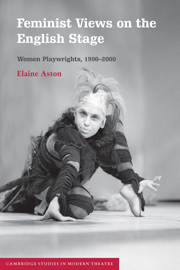Book contents
- Frontmatter
- Contents
- Acknowledgements
- 1 A feminist view on the 1990s
- 2 Telling feminist tales: Caryl Churchill
- 3 Saying no to Daddy: child sexual abuse, the ‘big hysteria’
- 4 Girl power, the new feminism?
- 5 Sarah Kane: the ‘bad girl of our stage’?
- 6 Performing identities
- 7 Feminist connections to a multicultural ‘scene’
- 8 Feminism past, and future? Timberlake Wertenbaker
- 9 Tales for the twenty-first century: final reflections
- Notes
- Bibliography
- Index
9 - Tales for the twenty-first century: final reflections
Published online by Cambridge University Press: 22 September 2009
- Frontmatter
- Contents
- Acknowledgements
- 1 A feminist view on the 1990s
- 2 Telling feminist tales: Caryl Churchill
- 3 Saying no to Daddy: child sexual abuse, the ‘big hysteria’
- 4 Girl power, the new feminism?
- 5 Sarah Kane: the ‘bad girl of our stage’?
- 6 Performing identities
- 7 Feminist connections to a multicultural ‘scene’
- 8 Feminism past, and future? Timberlake Wertenbaker
- 9 Tales for the twenty-first century: final reflections
- Notes
- Bibliography
- Index
Summary
Churchill's The Skriker established a recurrent concern of the 1990s: the child at risk. Where second-wave feminism in the 1970s took account of a ‘lost’ past, women's absence from history, culture and society, in the hope of securing a radical transformation of women's lives in a contemporary present, feminism at century's end is more concerned with the future, or more specifically, the ‘uncertain’ dark future in which children, girl children especially, are increasingly at risk. When the Skriker transports Lily forward in time, she meets her women descendants. The girl child from the future ‘bellows wordless rage’ at Lily. She hates her as one of ‘the distant past master class’ responsible for her inheriting a black ‘cemetery’ of a world. Fairy tales traditionally encompass the idea of transformation: of a better world, but the tales that women write for the English stage in the 1990s tell of the inequalities and injustices that militate against the idea of a better future. To conclude and to reflect on past chapters, I offer a brief look at some final, additional tales that sound a cautionary note for the twenty-first century, though not without a glimmer of hope, a glimpse at the possibility of change.
The future at risk in The Skriker is bound up in a society that fails to care enough about its vulnerable young mothers. Josie kills her baby and Lily does not manage to save the ‘future’ for her child.
- Type
- Chapter
- Information
- Feminist Views on the English StageWomen Playwrights, 1990–2000, pp. 169 - 173Publisher: Cambridge University PressPrint publication year: 2003



